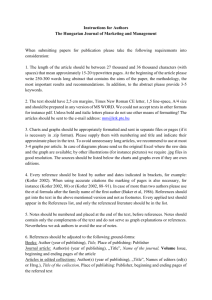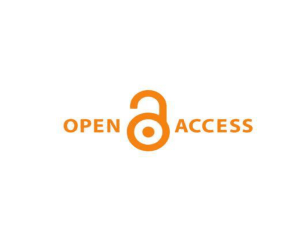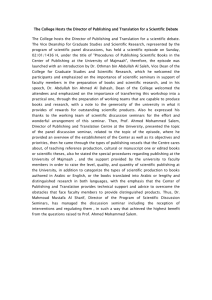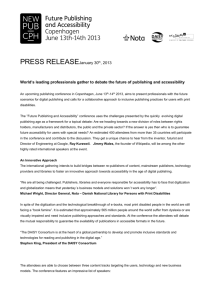Charging in the Open Access Environment
advertisement
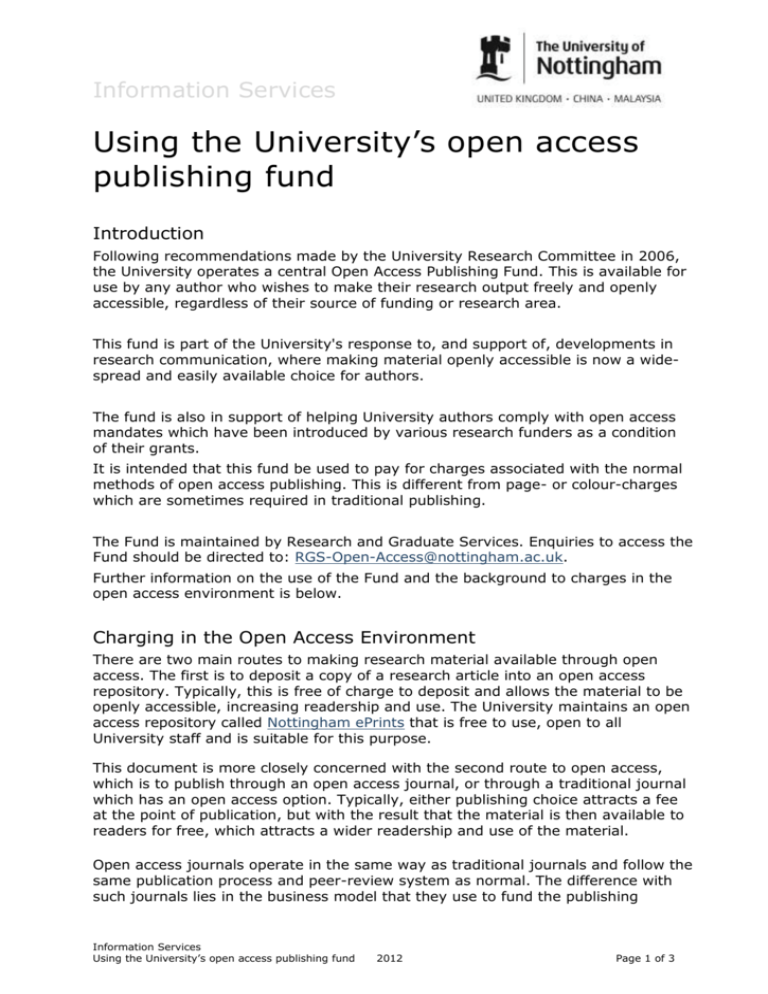
Information Services Using the University’s open access publishing fund Introduction Following recommendations made by the University Research Committee in 2006, the University operates a central Open Access Publishing Fund. This is available for use by any author who wishes to make their research output freely and openly accessible, regardless of their source of funding or research area. This fund is part of the University's response to, and support of, developments in research communication, where making material openly accessible is now a widespread and easily available choice for authors. The fund is also in support of helping University authors comply with open access mandates which have been introduced by various research funders as a condition of their grants. It is intended that this fund be used to pay for charges associated with the normal methods of open access publishing. This is different from page- or colour-charges which are sometimes required in traditional publishing. The Fund is maintained by Research and Graduate Services. Enquiries to access the Fund should be directed to: RGS-Open-Access@nottingham.ac.uk. Further information on the use of the Fund and the background to charges in the open access environment is below. Charging in the Open Access Environment There are two main routes to making research material available through open access. The first is to deposit a copy of a research article into an open access repository. Typically, this is free of charge to deposit and allows the material to be openly accessible, increasing readership and use. The University maintains an open access repository called Nottingham ePrints that is free to use, open to all University staff and is suitable for this purpose. This document is more closely concerned with the second route to open access, which is to publish through an open access journal, or through a traditional journal which has an open access option. Typically, either publishing choice attracts a fee at the point of publication, but with the result that the material is then available to readers for free, which attracts a wider readership and use of the material. Open access journals operate in the same way as traditional journals and follow the same publication process and peer-review system as normal. The difference with such journals lies in the business model that they use to fund the publishing Information Services Using the University’s open access publishing fund 2012 Page 1 of 3 process. In essence, the costs are paid for at the point of publication, rather than afterwards through individual reader or institutional subscriptions. By covering the costs of publication beforehand, this business model allows the journal to make their content available for free to any interested reader or researcher. The publication cost typically lies between £250 - £2500 and is seen by most research funders as an allowable expense within their research grants. Increasingly, traditional publishers such as Springer or the Oxford University Press are introducing open access options within their traditional journal system. Although exact details vary between publishers and journals, such options typically mean that an article is processed as normal and sold by the publishers as part of the journal within a subscription package. However, in addition, payment of an supplementary fee means that the publisher will also make the article available on an open access basis. Such fees are generally around £1500. In either case, such publishing charges can be covered by the use of the University Open Access Publishing Fund. Research Funders' Open Access Mandates There is a short document "Research Outputs and Funder Policies" which outlines the requirements of different research funders and the responsibilities of University of Nottingham researchers to provide open access, together with the assistance which is available. Currently six Research Councils (AHRC, BBSRC, ESRC, MRC, NERC, STFC) have mandates which require Open Access dissemination for outputs from grant-funded projects. Other funding bodies such as the Wellcome Trust have requirements that research outputs be disseminated via open access routes. This is part of a global move towards open access dissemination involving other funding bodies around the world. As noted above, the University maintains an open access repository called Nottingham ePrints that is suitable for use in fulfilling the requirements and recommendations from some of the UK Research Councils and other funding bodies. University staff are encouraged to use this resource both to meet the specific requirements of the Research Councils and for any other research outputs where staff choose that they should be available through open access. Some funding bodies, such as the Wellcome Trust, have a requirement for authors to deposit their articles in a national repository called UK PubMed Central (UKPMC). In such cases, authors typically can either deposit directly into UKPMC, or where agreements exist, pay the publishers of their article an additional fee to archive the material for them into UKPMC on an open access basis. The Wellcome Trust sees such expenses as a part of the cost of doing research. Authors can apply to the Wellcome Trust for additional resources to cover this cost. In addition, the Wellcome Trust has provided the University with subsidiary funds to assist individuals with Wellcome Trust grants to meet the cost of such open Information Services Using the University’s open access publishing fund 2012 Page 2 of 3 access publishing options. These funds are channelled through the Open Access Publishing Fund. Other funding bodies with open access requirements, including the majority of the UK Research Councils, see the cost of open access publishing as being covered by the full economic costing (fEC) of research and contained within the research grant. There can be an issue of timing in seeing open access publishing costs as part of a research grant. Articles arising from research projects are typically published some time after the end of the project itself. It can then be difficult or impossible to claim open access publishing costs from the research grant which may have been closed. The University's Open Access Publishing Fund overcomes this timing issue by holding a fund centrally which authors can access at any time up to the point of publication. Summary - information, advice and assistance If you want to make your research articles or other outputs available to a wider readership through open access, or if you are required to do so by your research funder, then there is support within the University for you to do this. The Open Access Publishing Fund is maintained by Research and Graduate Services. Enquiries to access the Fund should be directed to:RGS-OpenAccess@nottingham.ac.uk. Information and assistance in using the University's open access repository, which is maintained by Information Services, should be addressed to Bill Hubbard (bill.hubbard@nottingham.ac.uk ) and further information is available from eprints.nottingham.ac.uk Summaries and comparisons of research funders' open access mandates can be found in an online service called JULIET (www.sherpa.ac.uk/juliet), which is run by the SHERPA team at the University. Summaries and comparisons of publishers' open access permissions and their compliance with research funders' mandates can be found in an online service called RoMEO (www.sherpa.ac.uk/romeo), which is run by the SHERPA team at the University. Information Services Using the University’s open access publishing fund 2012 Page 3 of 3

